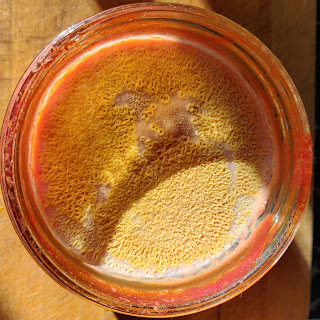It took a year to ferment this project into something worth keeping alive.
Without a doubt, this project was founded on the basic academic principles of more is better, publish or perish, all the projects perpetually forthcoming. Under the guise of knowledge promotion, our gauge for success was always in units of output (that is, proving one’s worth in the successive wins on a CV) and doing so without ever looking at the cumulative cost of constantly mobilizing. That intensity was unpalatable, rotten even, and I needed this year to reorient and recuperate. So, I treated this project like I do many questionable ferments: I cut away the spoiled bits, wrapped it up in some new skins, and set it aside in the hopes that it’d reestablish a teeming, vibrant energy over time.
And this sort of slowing down was necessary, especially when the world’s capacity writ large is being tamped down by relentless threats—racism, viruses, a burning planet. I certainly don’t have the heart or the energy to ask for more work in these times. Not from co-conspirators, not from myself. Overwork, over-extraction. These are the results of too much, an abundance never requested. It’s forced. And I no longer wish to be the force behind these endeavors. Terrified, petrified. Times of immobile shock are not the time to force a move. It’s a time to be still. That’s what 2020 was: a time to be still and let the range of human emotion course through me as I took note of what resonates, what is an undeniable priority, and how I could become more deliberate and intentional with my work. To continue believing in old models of productivity-as-worth is to tread water. To expect others to do this is just sinister. And to let it go unexamined is absurd.
The absurdity was super clear to me when a dear friend and colleague sent me Sabrina Orah Mark’s “Fuck the Bread. The Bread is Over” in which the author writes about the impermanence of some things while others endure:
“And maybe the bread, as I’ve always understood it, really is over. The new world order is rearranging itself on the planet and settling in. Our touchstone is changing color. Our criteria for earning a life, a living, are mutating like a virus that wants badly to stay alive.”Procuring flour for pandemic baking is not just about bread but ties in with identity and ritual; it is indicative of how purpose can become muddled and obscured when all around us is ablaze in the meme of the year: this is fine. Nope, it isn’t fine. What matters is self-reflection, grounding, and a commitment to doing things differently.
What I’m writing right now may seem a bit manifesto in tone, as if leading up to something. I am—but I’m not ready to share it just yet. For I want to be sure that if this project is to produce something and prove its existence as being worthwhile, then I want what we do to be mutually fun, minimally extractive, built on wonder and (dare I say) compassion instead of the assumption that business as usual will get us through to the next phase. I am tired of that expectation of constantly capitalizing on opportunities for (self)promotion because I’m fearful of reinscribing the very self-centeredness that plagues academia to begin with. At the same time, I remain hopeful now, more than ever, because care and thoughtful considerations of our collective wellbeing will indeed need to come before any one achievement. Throughputs over outputs. Process over product. It is how we get to next.
